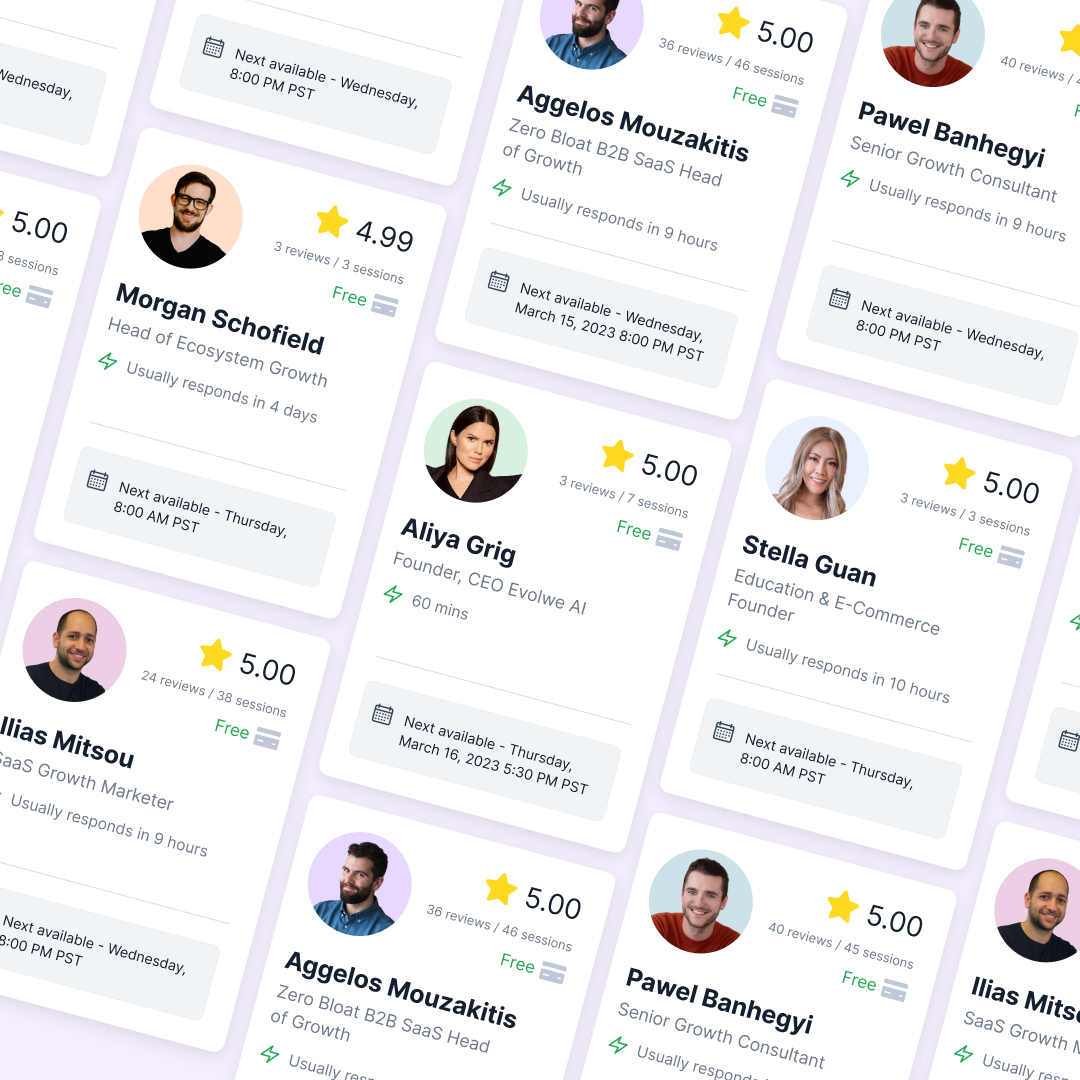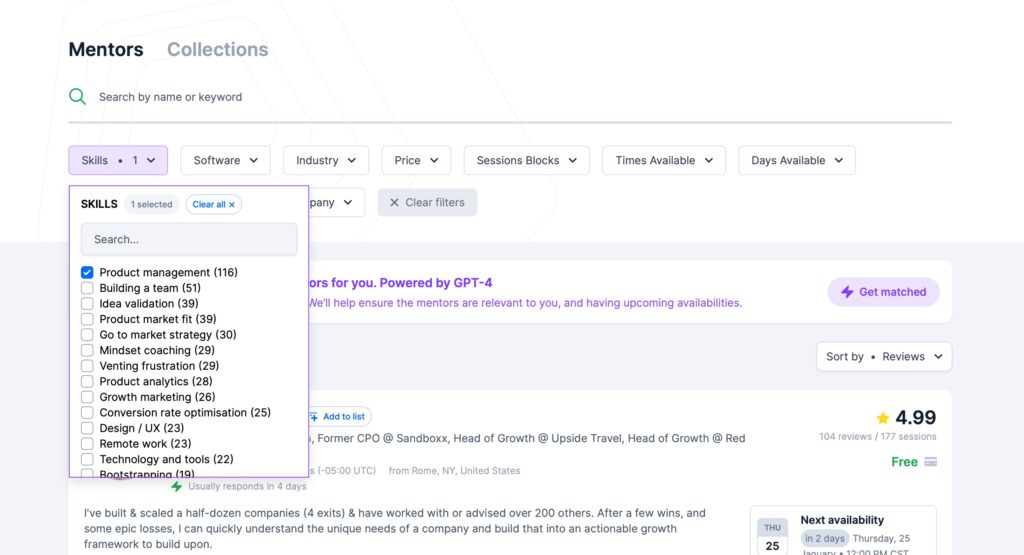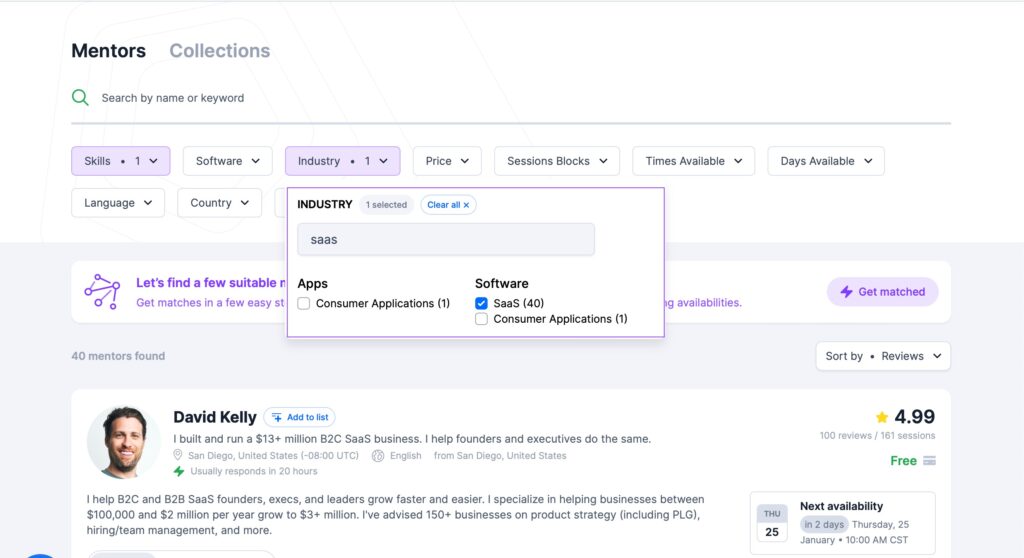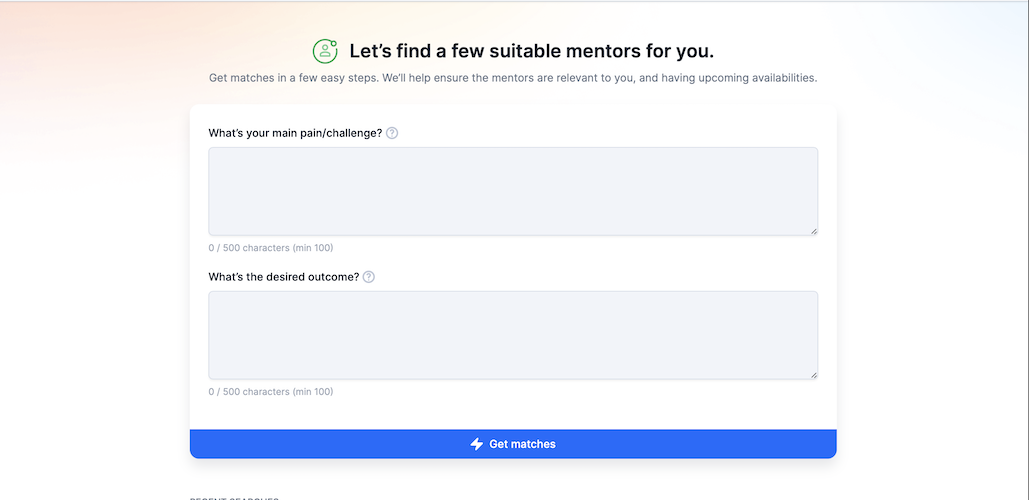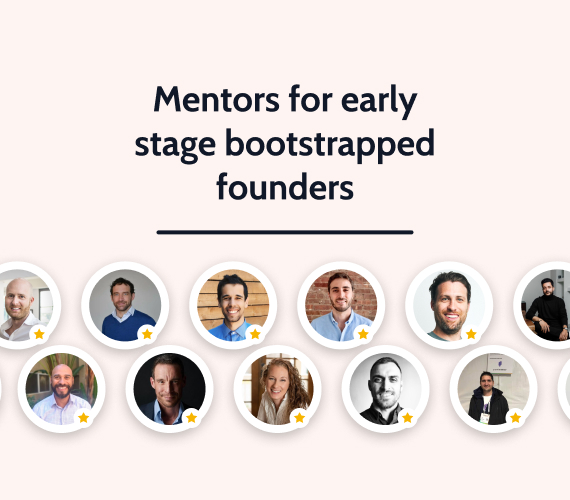98 Must-Ask Questions for Your Product Management Mentor
A very wise Head of Product once said: “Product management skills are a lot like tools in a toolbox. The longer you’re a PM, the more tools you add to your toolbox and the better you learn how to use them. But the best PMs push themselves to learn from everyone around them so they’re constantly adding new tools and frameworks.”
So maybe you want to add more tools to your PM toolbox. And you’ve probably figured out that chatting with a mentor would be a great way to do that.
But you’re not sure what to ask.
Fortunately, once you’ve read this article, you’ll have plenty of options. After all, we specialize in matching mentees to mentors in the tech space, especially those at product-driven startups. And that’s exactly why we gathered this list of 98 questions to ask your product management mentor, all organized by the various areas under the product umbrella.
But before we get started on questions, let’s cover a bit about being a good mentee.
A Quick Primer on Being a Good Mentee
Being a good mentee comes down to a few main points, most of which center on preparation, respect, and keeping a growth mindset.
Before your session, make sure to prepare a list of questions or outline some form of agenda. You can send this to your mentor beforehand if you feel it’s appropriate, or simply use it as a way to guide your discussion. Do mind your available time and ensure you don’t try to pack too much into your session with your mentor.
Now, we’re sure this goes without saying, but take time to get to know your mentor. Do research before your session on their work and take a minute or two at the start of the session for a bit of introductory small talk. Because no matter how experienced or famous your mentor is, they’re just people too and will appreciate you went the extra mile to learn more about them.
Finally, keep an open mind throughout your discussion with your mentor. You want to listen and ask questions more than you make statements. And, though it can be difficult if you’re talking about sensitive topics, try to stay curious rather than defensive. Remember, your mentor is there to tell you what you need to hear, not necessarily what you want to hear. But, if you understand the advice is meant to help unblock you and keep your product work (or career) moving, you can save yourself time and a ton of frustration.
With your mentee primer out of the way, let’s dive into questions you can ask your mentor! We’ve included a list of questions as well as recommended mentors you can chat with on each topic here at GrowthMentor if you join.
Questions to Ask Your Mentor…
About Product Strategy and Vision
Product strategy and vision are often one of the most difficult areas for PMs to tackle. After all, they require aligning the current needs of the business, the current state of the product team, and the business’s and product’s long-term goals. Fortunately, a mentor can help you get your strategy and vision straight. Ask questions like:
- How can I ensure our product goals are measurable and can show as direct a contribution to the business’s success as possible?
- How do you go about crafting a compelling product vision that resonates with our internal teams and, if we plan to use this vision in product marketing, our customers as well?
- What can I do to ensure our product roadmaps are clear yet flexible enough to allow for alterations?
- Do you have best practices for handling situations where there’s a possible misalignment between business strategy and the product strategy?
- What’s the difference between a product strategy, a product vision, and a roadmap?
- When planning strategy, how do you balance short-term gains with long-term vision?
- Do you have any best practices for prioritizing elements of our strategic efforts on a quarter by quarter basis?
Our Mentor Recommendation for This Topic:

About Idea Generation and Validation
At some point, the greatest product features were nothing more than “crazy ideas.” But if you can put a strong idea generation and validation process in place, those ideas won’t slip away from your team. Talk to your mentor about how to do it with questions like:
- Do you have any systems to ensure product ideas, both small improvements and large loonshots, are logged and stored for future reference?
- What are the best practices for brainstorming ideas as a team? Are there any methods we need to avoid because they’re inefficient?
- What feasibility and viability criteria do you typically use when validating product ideas?
- What criteria or frameworks do you recommend for prioritizing features in a product backlog?
- Can you share strategies for handling conflicts and trade-offs when prioritizing competing features?
- Do you have any advice on balancing the need for innovation with practicality in the idea validation stage?
- How do you prioritize work on different innovative ideas, especially if they’ve been requested by different teams or stakeholders?
Our Mentor Recommendation for This Topic:

Owner @ Integrity Inspired Solutions: Software Developer, Product Manager, Agile Coach
About Discovery and User Research
For many PMs, the discovery phase and getting to talk to users are two of the best parts of the job. But not every company is at the same level of research maturity. Your mentor can help you figure out the best way to build user research into your product function. Ask them questions like:
- How can we instill a culture of continuous discovery in our product team?
- What are best practices for mapping our opportunity- (or problem-) space to ensure thorough mapping without going overboard?
- What are best practices for conducting user research as a team? Should the product manager conduct all interviews or should everyone within the product trio conduct them?
- How do we determine the best research method to use for our specific discovery needs?
- Our company isn’t quite convinced of the value of user research. How can we demonstrate it and build a research culture into the wider business?
- We’re having a hard time finding users willing to do interviews. Do we need to pursue proxy audiences or are there other methods we can use instead?
- How can we ensure that insights from user interviews are shared within the product team and in the wider company?
Our Mentor Recommendation for This Topic:

Product Manager at a CleanTech startup
About Defining Product Requirements
Gone are the days of miles-long PRDs that came with the waterfall development style. Instead, today’s product requirements frameworks are more fluid. But with fluidity comes an extra layer of complexity. Let your mentor help you navigate it with questions like:
- How do we best prioritize our users’ pain points?
- What are the best methods to ensure customer insights are accurately translated into actionable product requirements?
- What guidelines do you follow for creating effective user stories that help (rather than hold up) the product development process?
- What strategies do you employ to ensure effective collaboration with diverse stakeholders in defining project scope?
- How do you handle changes in product requirements and communicate them to development teams?
- What tools or methodologies do you find effective for documenting and managing product requirements?
- How do you communicate product priorities across teams who are not typically directly involved in the early stages of product development? (I.e. marketing, customer success, sales)
Our Mentor Recommendation for This Topic:

Director of Product, Growth @ PandaDoc | Startup Advisor | PLG leader | 2x @ Unicorns
About Product Design and UX
Love it or hate it, the design phase is one of the integral parts of bringing a great product to market. But as a PM, you’re probably wondering how you can work well with your design counterparts and facilitate faster processes rather than being another blocker. A mentor can help. Ask them questions such as:
- How do you navigate the challenge of balancing user feedback on product designs against business requirements and technical constraints?
- In your experience, has user testing often led to significant product improvements? Can you share a case where it did?
- How do you prioritize and implement design changes based on user insights and feedback?
- What are some best practices for collaborating effectively with designers?
- What strategies do you employ to strike the right balance between aesthetic design and functional requirements?
- What are some best practices for synthesizing and sharing data from user testing with the design team?
- How can you balance the need for efficiently moving through the design phase with the need for user feedback and likely design changes?
Our Mentor Recommendation for This Topic:

Product Design (UX/UI) ▪️ Product Strategy ▪️ Marketing websites for B2B SaaS
About Product Development
Product development: the phase where the rubber hits the road and reality (aka technical feasibility) sets in. But the development phase shouldn’t feel like navigating a maze. Talk to your mentor about how to prepare yourself with these types of questions:
- What approaches do you recommend for overcoming challenges in aligning product vision with technical implementation?
- What strategies do you use to maintain a balance between short-term sprints and long-term product goals?
- How do you determine if technical debt has a potential to adversely affect the product development process and will need to be tackled before certain product features?
- What are best practices for collaborating with technical leads to ensure technical feasibility in product development?
- What strategies do you employ to minimize disruptions caused by technical roadblocks?
- What methods do you find effective for providing regular updates on product status to stakeholders?
- How can a product manager communicate technical progress and challenges in a way that’s accessible to non-technical stakeholders?
Our Mentor Recommendation for This Topic:

SaaS CTO🧑💻 | Product Leader & Strategist🎖️ | Growth & Scaling📈 | Agile & Lean enthusiast😍
About Product Launches and GTM
It’s every PM’s dream to have launched a feature. However, it’s also every PM’s nightmare to have to launch a feature. Don’t let the cross-team coordination and moving parts unnerve you. Get your mentor’s perspective. Ask them:
- Can you share insights on coordinating cross-functional teams to contribute to the go-to-market strategy?
- We have a product marketer and/or product marketing team. How can I collaborate effectively with them to ensure a successful launch?
- We do not have a product marketer or product marketing team and I have not been directly responsible for these areas in the past. What launch activities do I need to prioritize first?
- How do you foster collaboration between marketing, sales, and support teams for a cohesive product launch?
- What are some best practices to ensure consistent messaging across different teams during a product launch?
- What possible challenges do I need to be aware of when coordinating product launch activities? Can you share examples of challenges you’ve encountered in the past?
- How do you determine what metrics or KPIs to use to measure the success of a product launch?
Our Mentor Recommendation for This Topic:

Growth @ CoinStats. Pricing Strategy & Subscription Optimization. CRM & Retention Strategy. Reforge Practitioner.
About Growth Product Management
Growth product management is a bit like the mad scientist side of the PM world. You run a lot of experiments, fail a lot, but then those successes feel like magic. If you’re looking to start a growth product effort, ask your mentor questions like:
- How can you build proper experimentation processes into your growth product efforts?
- What considerations do you take into account when experimenting with unconventional product growth tactics?
- How do you balance the need for cohesive and clean UX with tests aimed at innovation?
- Do you have any stories about ways you used data-driven decision-making to make significant user experience improvements in the past?
- How do you determine which product features are prime candidates for A/B testing and experimentation?
- How can we ensure that we’re experimenting, iterating and learning continuously rather than experimenting once and assuming that’s “optimized?”
- I’m interested in moving into growth product management. How do I know if this area of product management is a good fit for me?
Our Mentor Recommendation for This Topic:

Product & Growth Manager
About Product Analytics and Performance Measurement
If a product feature gets adopted by most of the user base, but no one’s measuring adoption rates, is it still successful? Make sure you’ve got a good grasp of data. Chat with your mentor about questions like these:
- What considerations do you take into account when establishing success metrics for long-term product performance?
- What metrics do you typically consider in reference to short-term product feature performance and success compared to long-term product performance?
- Have you ever faced any challenges in implementing analytics solutions and how did you manage those challenges?
- What processes have worked well for you to stay up to date on the necessary metrics for measuring product health?
- How can I work with our data analyst or data analytics team to build useful product health dashboards that aren’t overwhelming?
- Considering the stage of our company, do you have any recommendations on how we can mature our product analytics function?
- How do you ensure that insights from data analysis directly inform and refine product strategies?
Our Mentor Recommendation for This Topic:

🇺🇦 Product Management from 0 to 1 | Health-Tech, Edu-Tech | SAAS, Marketplace, Platform | B2C, B2B
About Product Lifecycle Management
This can be one of the most complex elements for product managers to juggle. How do you continue to add new features, refine and update old ones, and do it all while keeping the overall product stable? Get your mentor’s expertise by asking questions like:
- What challenges do you encounter in balancing the need for innovation with maintaining stability during feature evolution?
- How do you foster a culture of continuous iteration and improvement within your product development team?
- How do you approach planning and executing product launches to maximize impact and user adoption?
- How do you proactively address and mitigate technical challenges that may arise during product launches or updates?
- How do you prioritize and allocate resources between new product development and ongoing maintenance?
- What are some best practices for managing technical debt while ensuring the scalability of existing features?
- Have you ever faced a scenario where you had to respond to unexpected challenges or resistance from your current user base regarding product changes and updates?
Our Mentor Recommendation for This Topic:

Business & Product Development
About Product Team Collaboration
While product managers will usually say: “the manager part of our title does not refer to managing people,” there’s still a ton of collaboration that’s necessary. And nowhere is this more true than within your product trio. Fortunately, your mentor can help guide you towards an ideal path that keeps everyone happy. Ask:
- How can I build trust with my design and engineering counterparts?
- I know as a PM, I need to avoid being completely hands-off while also not micromanaging. What can I do to strike that balance so my teammates can do their best work?
- How can I determine if I’m becoming a bottleneck in our decision-making processes?
- What’s the best way to make decisions so that the entire team feels involved and heard, but decisions are made quickly and efficiently?
- What role do you feel a PM should typically play in a product development trio?
- How do you handle situations where there are differing opinions within the product trio on feature prioritization or design choices?
- How do you foster a sense of ownership and accountability within the product trio for project outcomes?
Our Mentor Recommendation for This Topic:

Product & Growth Leader, Former Director @ Shopify
About Stakeholder Management
Stakeholder management is likely the make-or-break skill for PMs. But, like team leadership, it’s roughly impossible to do well on your own right off the bat. This is where a mentor can save you. Soak up all of their stakeholder management wisdom by asking questions like:
- How can I improve my communication skills, especially in relation to communicating with stakeholders?
- How do you manage conflicting expectations among different stakeholder groups?
- What are some best stakeholder communication practices to minimize chances of late stage blowups?
- How do you handle situations where stakeholder priorities shift mid-project?
- Is there a certain point we should ask stakeholders for feedback on our product designs? When should that be done and how do we balance incorporating stakeholder feedback with incorporating user feedback?
- How do you typically manage communication when a project experiences a setback or challenge without compromising stakeholder confidence?
- How do you manage scenarios where a stakeholder’s feedback is in direct conflict with a previously agreed-upon product strategy?
Our Mentor Recommendation for This Topic:

About Growing Your Career as a PM
There are hundreds of ways to get into product management. And because of variations in company size, industry, and maturity, no two PM roles are the same, even if they share similar titles. Look at that as a vast realm of opportunity. Get guidance from your mentor by asking questions like:
- Are there senior roles in the PM world that maintain individual contributor (IC) status rather than requiring a jump to a managerial position?
- What skill gaps do I need to look out for when trying to move from an IC PM to a manager PM position?
- What makes the difference between a good PM and a great PM?
- What soft skills are most important for becoming a great product leader?
- Should I consider specializing in a specific industry or element of product or focus on being a generalist with wide ranges of experience?
- What resources do you typically use to keep up to date on what’s going on in the realm of product management?
- What are some of your favorite product management frameworks, and why?
Our Mentor Recommendation for This Topic:

About Handling Stress and Preventing Burnout
Product management can often be a stressful job. Between juggling stakeholder expectations, managing setbacks and difficulties, and recovering when feature launches don’t go as planned, there’s a lot to worry about. Your mentor, however, can help you take a step back and get a clearer mind. Ask them:
- How do you manage your time so you can cover all the different areas a PM has to manage?
- How do you prevent yourself from suffering too much context-switching in your daily work?
- What habits have you found most effective for staying productive?
- Do you have any recommendations for how to deal with the emotional element of development setbacks, late stage blowups, and unsuccessful launches?
- How do you maintain work-life balance? Do you have any strategies you found particularly useful?
- I’m concerned I’m getting burnt out. What preventative measures do I need to take now before I hit real burn-out?
- I feel like every day is overwhelmed with meetings. How can I get more focus time in my workweek?
Our Mentor Recommendation for This Topic:

Strategy & Experience Consultant | Executive Coach | Building out 2 ventures as you read this 👀
How to Find A Product Management Mentor Through GrowthMentor
So now that you’re armed with plenty of questions to ask your mentor, you’ve hopefully got the confidence to schedule a session with your product management mentor and start chatting.
But what if you don’t already have one?
Well, this is exactly why GrowthMentor exists! Here’s how you can find a mentor on our platform:
First, you’ll want to visit the “browse mentors” page. You could just start scrolling.
But, since we have more than 600 mentors, you’ll want to narrow down your options first.
Within our mentor search, you can apply filters to search for mentors with specific skills, software expertise, industries, or current and former companies. There are 275 different software areas to filter by, 30 skill areas, 300 industries, and more than 100 mentor companies.
For example, let’s say you’re facing questions about product management at an early stage SaaS startup and you want a mentor with experience in both of those areas. All you have to do is check “Product Management” under skills, for 106 mentors:
And then, after a quick search for “SaaS” under “Industries”, check that box to narrow your field down to 40 mentors:
We usually recommend applying no more than 2 filters at a time, as certain filters (such as a mentor’s previous or current company) can pinpoint fairly specific results.
But in some cases, your filters may still yield a fairly large pool of potential mentors, like our 40 SaaS mentors with product management experience above.
To focus your options even more, you can search for specific keywords in our general profile search. Within our “SaaS” and “Product Management” filters, a search for the keyword “app” produces 13 mentor options, a search for “Head of Product” yields 3 options, and a search for “growth product” produces 6.
From there, it’s just a matter of browsing your options and determining which mentor seems like the best fit for you.
However, sometimes you’re in the throes of decision fatigue and simply don’t have the time or energy to sort through even five or ten mentor options.
Situations like these are exactly why we built our new AI matching engine:
Simply describe your primary pain-point, add your desired outcome, and in a matter of minutes, you’ll be matched with three different mentors who will be a great fit to help with your challenge.
Then, it’s just a matter of booking your call and asking your questions.
So if you want the fastest way to talk to a huge pool of experienced, pre-vetted mentors, we recommend joining GrowthMentor.
Get All Your Product Management Questions Answered
